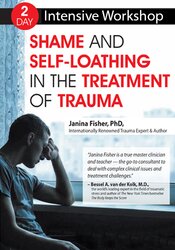

Shame... have you noticed how it sticks like super glue to our clients and acts as a barrier to trauma resolution?
Even after effective trauma treatment, shame and self-loathing can interfere with our clients’ full participation in life.
Watch world-renowned complex trauma and attachment expert Janina Fisher, PhD, as she reveals today’s most effective modalities for treating shame and self-loathing in trauma clients.
The body-oriented interventions featured in this certificate recording will help clients relate to their symptoms with mindful dual awareness and curiosity so that, when integrated with traditional psychodyanamic, cognitive-behavioral, and EMDR techniques, issues of shame can become an avenue to transformation rather than a source of stuckness.
If you are frustrated with the lack of treatment success with traumatized clients with chronic shame, this live webcast will provide the solutions for long-term healing.
Key Benefits:
This online program is worth 11.75 hours CPD.
| File type | File name | Number of pages | |
|---|---|---|---|
| Manual - Shame and Self-Loathing in the Treatment of Trauma (1.9 MB) | 47 Pages | Available after Purchase |

Janina Fisher, PhD, is a licensed clinical psychologist and former instructor at The Trauma Center, a research and treatment center founded by Bessel van der Kolk. Known as an expert on the treatment of trauma, Dr. Fisher has also been treating individuals, couples, and families since 1980.
She is past president of the New England Society for the Treatment of Trauma and Dissociation, an EMDR International Association Credit Provider, Assistant Educational Director of the Sensorimotor Psychotherapy Institute, and a former Instructor, at Harvard Medical School. Dr. Fisher lectures and teaches nationally and internationally on topics related to the integration of the neurobiological research and newer trauma treatment paradigms into traditional therapeutic modalities.
She is co-author with Pat Ogden of Sensorimotor Psychotherapy: Interventions for Attachment and Trauma (2015) and author of Healing the Fragmented Selves of Trauma Survivors: Overcoming Internal Self-Alienation (2017) and the forthcoming book, Working with the Neurobiological Legacy of Trauma (in press).
Speaker Disclosures:
The Neurobiology of Shame
Shame and Attachment: Its Evolutionary Purpose
The Meaning of Shame in the Treatment of Trauma
Treating Shame
Healing Shame: Acceptance and Compassion
Healing Shame in the Therapeutic Relationship
| 5 |
|
| 4 |
|
| 3 |
|
| 2 |
|
| 1 |
|
Satisfaction Guarantee
Your satisfaction is our goal and our guarantee. Concerns should be addressed to info@pesi.co.uk or call 01235847393.
Please wait ...